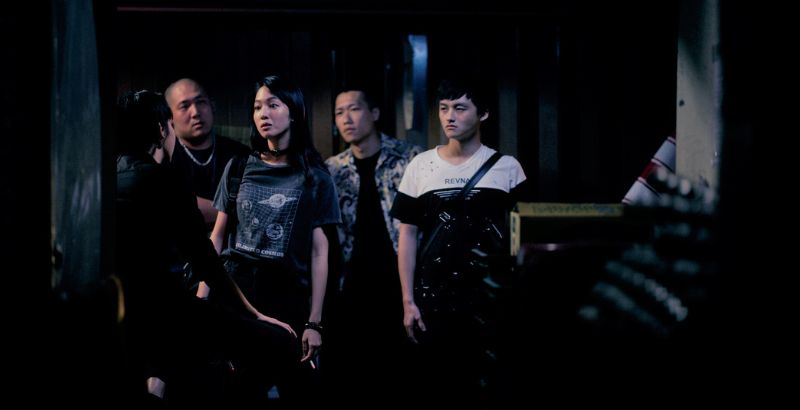
It’s never an easy feat to try to make sense of the most senseless acts of violence, but it’s an intrinsic part of human nature to do just that because for us the harm caused can’t be without reason. In his latest drama Goddamned Asura, Taiwanese director, and writer Lou Yi-An, tries to find the reason behind a random act of violence that shakes the country to its core when one night, college student and comic artist Jan Wen (Joseph Huang), goes to a crowded night market and proceeds to shoot patrons with a pressurized air pistol.
In one night. Within a few minutes, Jan Wen’s actions have forever changed the lives of the victims, their families, and the entire country.
With an ensemble cast that stars Huang, Wang Yu-Xuan – who won Best Supporting Actress at the 2022 Taipei Film Festival for her portrayal of Linlin a girl on the cusp of adulthood, whose connection is both filled with hope and heartbreak, and Devin Pan as Axing, Jan Wen’s best friend, and the one person whose inability to face his own role in the tragedy prompts the question of “What if?”.
Inspired by true events, Lou and co-writer Singing Chen use the film as a way to express the anger and confusion felt by people when our worlds are rocked to their core. Lou’s direction is raw in how he stays as close to reality, keeping his characters and the overall story as relatable as possible. Visually the film settles into specific color themes that inform the audience about the characters in very subtle ways, and the use of comic panels drawn by Jan Wen gives insight into a character who doesn’t understand himself, and the people around him.
Having premiered in 2021 at the Taipei Golden Horse Film Festival, Goddamned Asura has won multiple international festival awards and is the official Taiwanese selection for Best International Feature Film in the 95th Academy Awards, to be held in 2023.
For Carolyn Talks…I spoke with Lou to learn about what inspired him to make this film, and its themes of destiny, accountability, and unanswered questions.
Writer’s note: This interview was conducted with the aid of interpreter Wan-Ling Yu.
Carolyn Hinds: Yi-An can you tell me a bit about what inspired you to become a filmmaker?
Lou Yi-An: At first I wasn’t studying film or directing in college, instead I was studying advertising. But I had a classmate who wanted to start a film project and I was invited to join, and that classmate was actually also the co-writer of Goddamned Asura, Singing Chen.
She’s a Taiwanese director, and her VR project (The Man Who Couldn’t Leave) got awarded as the best VR project at the Venice Film Festival [Venice Immersive Best Experience]. So yeah, I joined her project, and a group of my classmates joined too, and that’s how things got started. But later on, I realized that I also have things to say. I wanted to express myself, so I started to write stories and that’s how it began.
Carolyn: What inspired you to write Goddamned Asura? The film is interesting to me because at the beginning it’s not clear where the story is going, but I think by the end it has a very clear message about destiny, accountability, and also interpersonal relationships between lovers as well as family members and friends.
Lou Yi-An: In 2014, there was a pretty shocking random killing attack in Taiwan. Back then, it was a very hot topic in Taiwanese society, and people were talking about whether we should abolish the death penalty. Everyone was talking about this, and there was a series of in-depth news articles about random killings and about this perpetrator and the director of Reddit.
And it got me starting to think about if this person really deserved to die. And I was trying to find the answer about what kind of sin is so big that it can’t be forgiven. and the more I read about the story, the more I realized there might be an unknown side to this perpetrator that might be maybe even pure.
So, I started to write the story and ask questions like, what does it mean for a person to be cold-blooded, and how does the blood get cooled down in the first place? So I tried to explore the possibility of whether it’s possible to…represent the other side. Other sides of the perpetrator, and maybe I was trying to restore this…this demon in people’s eyes back to human.
Carolyn: You talked about showing the other side of the perpetrator that people may not have known because, in the news, people only know the perpetrator from the action they committed and the consequences of that, but in the film, you’ve also shown the victims’ lives as well. You show who they were before this traumatic event. Their lives, and who their friends and family were, showing how they’re all interconnected, like six degrees of separation as we’d say.
Lou Yi-An: Actually, in the early stage of writing the script, the story was pretty different.
Originally, I saw these characters as at least partially a reflection of myself. Reflections of my own background, and I was thinking that maybe if I made some different decision back then when I was 18 years old, maybe I would have become a totally different person. I was wondering how would people judge me, or know me that way? So through this kind of question, I started to explore the possibilities of these characters. In this film, we see the perpetrator, the victims, the family and friends of these people, and also people who witnessed this incident, and who could potentially stop what happened.
I wanted to explore their own struggles and their flaws. I didn’t want to really only see the sides of them that are good, but also bad, evil even. Through kind of establishing the connection between these characters, I wanted to find a possibility…for them to you know…to reset their lives and even to make different decisions and have the possibility to break out from their own destiny, and to maybe have a different life.
So, yeah, I wanted to put all these people from different classes of society, and again, kind of restore them back to human and to see their real faces of them.

Carolyn: Okay, so there are some things you mentioned that I want to come back to, and the first one I want to talk about is you say that the characters are like reflections of yourself, how you see yourself and thought about what happens from your own perspective about how there’s good and evil in everyone. Is that why you named the film “Goddamned Asura”, from my research Asura is the name of a class of beings in Hindu mythology. And in this class of beings, some represent good, some represent evil, and some are benevolent, so was that what inspired not only the name but also the overall theme of exploring both the good and the bad of the victims as well as Jan Wen?
Lou Yi-An: Actually, I only got to know more about Asura at a pretty late stage when I was writing the script. I didn’t have it in mind when first writing the story, but I did some research and found out about this Asura which, according to my research represents anger and violence, then. In fact, for the film title originally, the crew only had the word “Goddamned” in mind because “goddamn” in the Chinese translation has a meaning more explicitly talking about this [idea of] deserving to die, in addition to the meaning of deserving to be condemned. Yeah…so that’s something that’s close to the core of the film because the film is trying to talk about whether this person deserves to die right?
So that’s what we had originally. But we wanted to add something after “Goddamned” that you know was closer to the creation of the story, and I found that with Asura, with the meaning of anger and violence, which I thought was a pretty appropriate thing to put as the title.
Carolyn: Yes, “goddamned” in English can be used two main ways; one as an expletive almost as a curse or sign of frustration where you say the word “Dammit!”, or you can say “goddammit”, which is more of a profound exclamation, and then “goddamned”, where for instance it’s like you’re condemning the person or situation, and asking for like having retribution in a way. So I understand where you’re going with the title, and why you would use that name.
Another thing that was interesting to me is there’s a very specific metaphor that carries throughout the film in the use of the dog Oreo in a cage at the start of the film after the footage of the shooting is shown. We see that Jan Wen relates to this dog because he himself feels caged, he can’t get out of his personal situation. But what’s interesting about Jan Wen’s interaction with Oreo is that in the cage, he doesn’t seek to use the gun as a way to get him out of the cage. He thinks the only way to free Oreo is to kill him. And that to me, shows his mindset is very fatalistic, in that he doesn’t see how he himself has a way to get out of the cage that he thinks he’s in.
Lu Yi-An: From your comments, we can go back to the topic of the death penalty as we mentioned earlier. As you’re saying, when Jan Wen sees Oreo in the cage, he indeed is seeing at least a part of himself that’s having the same struggle right there. He’s kind of restrained in a way. But later after he releases Oreo, people caught him, and Oreo was back in the cage with chains. For Jan Wen, and for me actually, I think this is something a little bit like life imprisonment. Jan Wen was thinking what’s the point of living, going on to live like this, and he thought “I’ll just set him free.”
But I also want to talk about the eyes of the dog, because I think that dog’s eyes are very pure, and in fact, the ending song of the film, the title is ‘As Pure As a Dog’s Eyes’. Throughout the film, I tried to bring the audience to look at the dog’s eyes, so we would see [there are] a lot of close-ups of his eyes, and we’d see, how pure it is.
When I first met, Johnathan Huang, the actor who played Jan Wen, my impression is that his eyes are very pure, so I kind of made this connection between the dog and the character. Through this, I was trying to show and that this character could be a very simple person, but why does he kill? Does it feel right? And I was trying to find the answer to what went wrong.
Carolyn: In the last chapter of the film titled “Bridge of Hades”, the question of “What if?” is answered in a very interesting way. One of the characters (no spoilers) ends up in a very sad situation, and he questions himself on what could have happened had he not done what he ends up doing. For many of us when we think of those “What if?” moments of our lives, we imagine the alternative to be better than the reality, but as you show, what if it always necessarily isn’t better, and I thought that was interesting to do with this story.
Lou Yi-An: In the early stages of writing the script there wasn’t the intent to have this third chapter. During that process, I was trying to find a way to prove that this young perpetrator is actually a pure person who couldn’t do too big of a sin, but I couldn’t prove that because he did what he did right? So, I was struggling with that. But I realized that if we have this “What if?” scenario in the film, maybe I could find a way to prove that if given different circumstances they would make different decisions, and maybe they…not only the perpetrator, but also the other characters, they could try to make different decisions, and the audience we can all see that they’re just kids.
They’re very immature like everybody else, but there is no sin that’s that big for them. And also we can see in the third chapter, originally, the victim is just very boring and innocent. A civil servant who’s working and playing video games, but in the third chapter, he can also be a killer. So I was trying to bring out this kind of blurriness. Like you can’t really judge people by what they do and you can’t really tell who’s destined to do what, and who’s destined to die because of that.

Carolyn: We’ve talked about destiny being a main theme in the film, but I think another main theme is accountability and responsibility. How what happens in both realities before the “What if?” and the first half of the film had they not happened if people had taken responsibility for things they saw and knew were wrong in the beginning? Things could’ve been different if they hadn’t shifted blame onto others, because no one takes responsibility for their own decisions, and we see how that negatively impacted the people around them.
Lou Yi-An: I think that when any tragedy happens, it’s very easy for people to try to find a quick answer and try to find to reason you know…to kind of place blame on [other] people that’s involved. People would think “Why didn’t I do that?” “Maybe if I did something, maybe this wouldn’t happen.”, or things like this, and I’m asking in the film “Is this why Jan Wen kills people?”, but I don’t think I wanted to give a simplified answer to this. I don’t think that there is like an A plus B equals C kind of explanation. I think it is kind of almost impossible for us to answer this. We wouldn’t know. I think it’s endless.
For example, people will say, “It’s maybe because kids play video games too much, so they have a violent side or something, and so they go on and kill people.” But I don’t think it’s a good thing to do. I don’t think we should give a specific and simple answer, in terms of questions for this kind of tragedy.
Carolyn: No, I understand that completely. Because for tragic events, especially for tragedies like this, we as humans always look for an answer, but sometimes there just isn’t one. Or even if there is an answer, we can’t either understand it, or we don’t want to accept it because it doesn’t make sense to us morally, or logically.
We just can’t wrap our heads around someone wanting to harm others, especially in the way that Jan Wen does, which in a way seems very arbitrary. And without any feeling. You know? He just does it, and in the end, he himself doesn’t really know why he did it.
Considering the film is based on an actual event, and one that was very traumatic for many people and the country, what has the reception been from Taiwanese people?
Lou Yi-An: The reaction of the Taiwanese audience wasn’t very big. It’s not huge. I think that the film isn’t easy for the audience to get into in a way, and it isn’t really entertaining as some other films, or that relaxing, and it’s a little bit more serious. So that’s, that’s one of the reasons, I think.
And it’s not that people aren’t responding to the film. There have been serious discussions on topics like the death penalty, which is still going on in Taiwan, so audiences are responding in that way as well.






